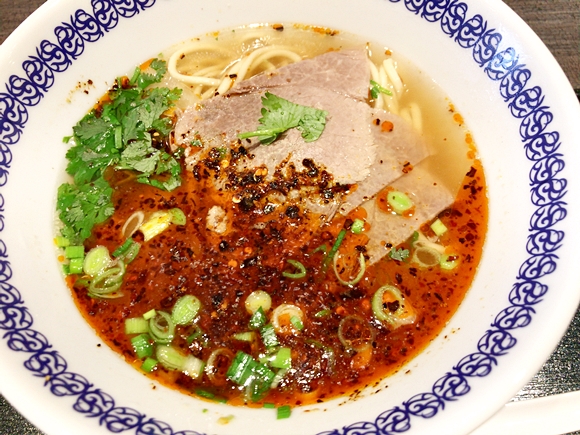
Mazilu Beef Noodles of the respected Lanzhou Lamian family lands in the fierce noodle battleground of Tokyo.
Do you know how everyone’s home has a unique smell? Well, our ramen-loving writer Ahiruneko thinks that every country has its own smell too. Much like with homes, it’s not clear how these distinguishing scents are made, but it probably has a lot to do with the food. Since smell is such a powerful force on taste, this inevitably alters the flavors of established foreign restaurants when they come to Japan to some extent.
Speaking of which, on 22 August, the latest foreign food enterprise hit the shores of Japan. It is Mazilu Beef Noodles run by the much-loved Lanzhou Lamian restaurants which boast over 100 years of service in China.
It probably goes without saying, but despite being firmly entrenched in the Japanese foodscape, ramen is a derivative of China’s lamian. So, as Ahiruneko made the short walk from Jinbocho Station he wondered if an authentic lamian restaurant could make an impact in Japan.
It was off to a good start anyway…
Even though he arrived about five minutes before the shop opened, there was a line-up of 30 to 40 people. News cameras from both Japan and China were also hovering around for the opening. While he waited, Ahiruneko noticed that many of the people in line with him were Chinese people of all walks of life, from students to business people.
He overheard many of them express relief that they could finally get a taste of Lanzhou Lamian in Japan. Even though our reporter had been to China, this would still be his first Lanzhou experience, and he was getting the feeling that he was in for a real treat.
When his turn arrived, Ahiruneko entered the door and…China! It was uncanny how this establishment somehow recreated that deeply ingrained scent of its home nation. It had only been a few months since his last visit to China, but he was beginning to feel a slightly wistful nostalgia.
He played it safe with a standard order of Thin Noodle Lanzhou Beef Noodles for 880 yen (US$8). This restaurant also allows customers to reduce the amount of chili sauce or coriander to “a little” or “none,” but again our reporter kept things unchanged for his first experience.
He heard that the noodles were handmade upon ordering, and yet his bowl arrived surprisingly fast. Already Lanzhou Lamian proved to be a big departure from Japanese ramen. The vivid colors were a feast for the eyes.
He heard that Lanzhou Lamian was represented by five colors: clear (the broth), white (the daikon radish), red (chili sauce), green (coriander and garlic leaves), and yellow (noodles). The soup itself was a blend of beef and various spices.
Going in for his first taste, Ahiruneko was taken aback. The flavor was rich but it had a spicy kick that he doesn’t usually get from Japanese ramen. He felt this was indeed the taste of China, so be warned if you come to Mazilu expecting Japanese ramen.
The noodles were delectably tender but had a unique texture that was unlike Japanese ramen, or even other Chinese lamian that he’s had before. Even though they were “thin noodles” they came out about as thick as regular Japanese ramen noodles.
It was all very delicious, but also very different from Japanese ramen. Although extremely satisfied with his first Lanzhou Lamian experience, Ahiruneko still wondered if this restaurant would catch on or not in Japan.
However, when he walked out the door, the line-up was just as long as it was when he went in. And as he walked back to the station the aroma of his meal lingered, giving him the feeling of walking through the streets in China.
Restaurant information
Mazilu Beef Noodles / 馬子禄 牛肉面
Tokyo-to, Chiyoda-ku, Kanda Jinbocho 1-3-18
東京都千代田区神田神保町1-3-18
Open: 11 a.m. to 9:00 p.m.
Website
Photos: SoraNews24
[ Read in Japanese ]




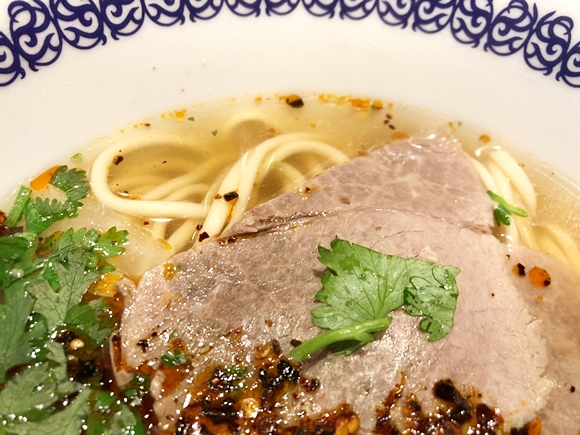
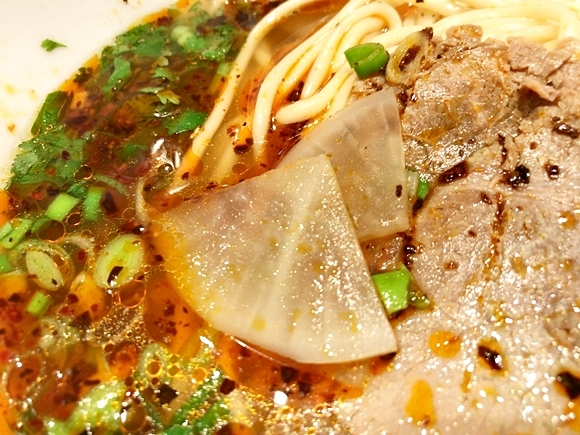
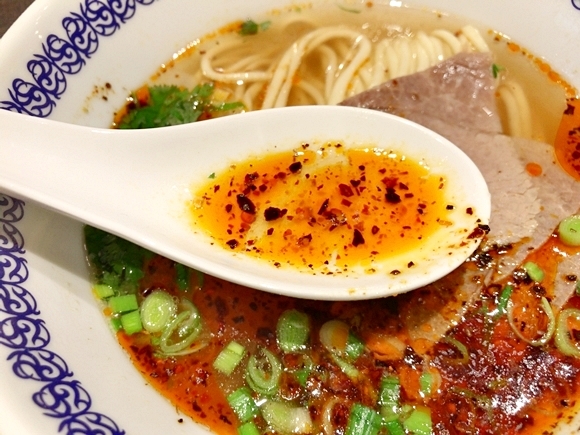
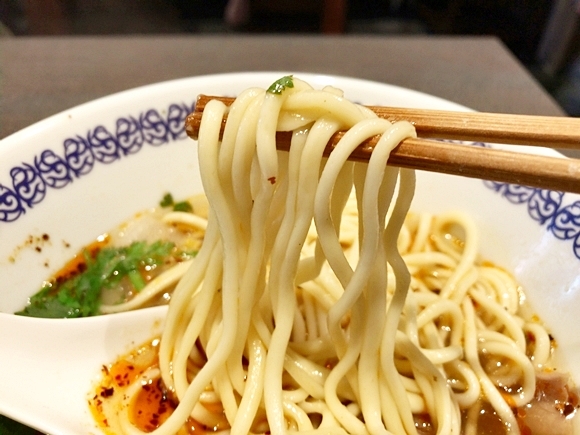
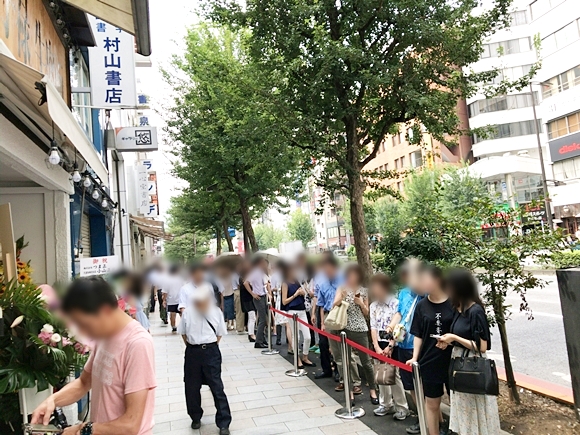
 Dutch restaurant’s odd ramen with soybeans has one ingredient we didn’t expect, lacks one we did
Dutch restaurant’s odd ramen with soybeans has one ingredient we didn’t expect, lacks one we did Chocolate ramen? Not only will we try that, we’ll be first in line! 【Taste test】
Chocolate ramen? Not only will we try that, we’ll be first in line! 【Taste test】 We go Brazilian at Tokyo restaurant that offers “Brazilian-style ramen”
We go Brazilian at Tokyo restaurant that offers “Brazilian-style ramen” Yakuzen ramen restaurant in Tokyo is very different to a yakuza ramen restaurant
Yakuzen ramen restaurant in Tokyo is very different to a yakuza ramen restaurant We try out “Chan Ramen”, an underground type of ramen popular in the ramen community
We try out “Chan Ramen”, an underground type of ramen popular in the ramen community Survey finds that one in five high schoolers don’t know who music legend Masaharu Fukuyama is
Survey finds that one in five high schoolers don’t know who music legend Masaharu Fukuyama is Highest Starbucks in Japan set to open this spring in the Tokyo sky
Highest Starbucks in Japan set to open this spring in the Tokyo sky Saitama is home to the best strawberries in Japan that you’ve probably never even heard of
Saitama is home to the best strawberries in Japan that you’ve probably never even heard of Tokyo Skytree turns pink for the cherry blossom season
Tokyo Skytree turns pink for the cherry blossom season Skyscraper sized Pokémon cards to appear in Tokyo all year long in Tocho projection mapping event
Skyscraper sized Pokémon cards to appear in Tokyo all year long in Tocho projection mapping event Top 30 tourist sites in Japan: the most popular sightseeing spots for overseas visitors
Top 30 tourist sites in Japan: the most popular sightseeing spots for overseas visitors Foreign tourists in Japan will get free Shinkansen tickets to promote regional tourism
Foreign tourists in Japan will get free Shinkansen tickets to promote regional tourism We mixed all 31 flavors of Baskin Robbins ice cream and created a Frankenstein dessert【Video】
We mixed all 31 flavors of Baskin Robbins ice cream and created a Frankenstein dessert【Video】 Why Sensoji temple in Asakusa is better at night
Why Sensoji temple in Asakusa is better at night Yakuzen ramen restaurant in Tokyo is very different to a yakuza ramen restaurant
Yakuzen ramen restaurant in Tokyo is very different to a yakuza ramen restaurant The 10 most annoying things foreign tourists do on Japanese trains, according to locals
The 10 most annoying things foreign tourists do on Japanese trains, according to locals Starbucks Japan releases new sakura goods and drinkware for cherry blossom season 2026
Starbucks Japan releases new sakura goods and drinkware for cherry blossom season 2026 Naruto and Converse team up for new line of shinobi sneakers[Photos]
Naruto and Converse team up for new line of shinobi sneakers[Photos] Is Sapporio’s Snow Festival awesome enough to be worth visiting even if you hate the snow? [Pics]
Is Sapporio’s Snow Festival awesome enough to be worth visiting even if you hate the snow? [Pics] Japan has trams that say “sorry” while they ride around town…but why?
Japan has trams that say “sorry” while they ride around town…but why? Sakura Totoro is here to get spring started early with adorable pouches and plushies
Sakura Totoro is here to get spring started early with adorable pouches and plushies Poop is in full bloom at the Unko Museums for cherry blossom season
Poop is in full bloom at the Unko Museums for cherry blossom season Shibuya Station’s Hachiko Gate and Yamanote Line stairway locations change next month
Shibuya Station’s Hachiko Gate and Yamanote Line stairway locations change next month Japan’s new “Cunte” contact lenses aren’t pronounced like you’re probably thinking they are
Japan’s new “Cunte” contact lenses aren’t pronounced like you’re probably thinking they are Japan’s newest Shinkansen has no seats…or passengers [Video]
Japan’s newest Shinkansen has no seats…or passengers [Video] Foreigners accounting for over 80 percent of off-course skiers needing rescue in Japan’s Hokkaido
Foreigners accounting for over 80 percent of off-course skiers needing rescue in Japan’s Hokkaido Super-salty pizza sends six kids to the hospital in Japan, linguistics blamed
Super-salty pizza sends six kids to the hospital in Japan, linguistics blamed Starbucks Japan unveils new sakura Frappuccino for cherry blossom season 2026
Starbucks Japan unveils new sakura Frappuccino for cherry blossom season 2026 Take a trip to Japan’s Dododo Land, the most irritating place on Earth
Take a trip to Japan’s Dododo Land, the most irritating place on Earth Is China’s don’t-go-to-Japan warning affecting the lines at a popular Tokyo gyukatsu restaurant?
Is China’s don’t-go-to-Japan warning affecting the lines at a popular Tokyo gyukatsu restaurant? Survey asks foreign tourists what bothered them in Japan, more than half gave same answer
Survey asks foreign tourists what bothered them in Japan, more than half gave same answer Japan’s human washing machines will go on sale to general public, demos to be held in Tokyo
Japan’s human washing machines will go on sale to general public, demos to be held in Tokyo Starbucks Japan releases new drinkware and goods for Valentine’s Day
Starbucks Japan releases new drinkware and goods for Valentine’s Day We deeply regret going into this tunnel on our walk in the mountains of Japan
We deeply regret going into this tunnel on our walk in the mountains of Japan Studio Ghibli releases Kodama forest spirits from Princess Mononoke to light up your home
Studio Ghibli releases Kodama forest spirits from Princess Mononoke to light up your home Major Japanese hotel chain says reservations via overseas booking sites may not be valid
Major Japanese hotel chain says reservations via overseas booking sites may not be valid Put sesame oil in your coffee? Japanese maker says it’s the best way to start your day【Taste test】
Put sesame oil in your coffee? Japanese maker says it’s the best way to start your day【Taste test】 No more using real katana for tourism activities, Japan’s National Police Agency says
No more using real katana for tourism activities, Japan’s National Police Agency says Chocolate ramen is back again at Tokyo restaurants for Valentine’s Day 2017, and we’ve tried it
Chocolate ramen is back again at Tokyo restaurants for Valentine’s Day 2017, and we’ve tried it Tokyo restaurant serves up unusual ramen with blue chicken broth
Tokyo restaurant serves up unusual ramen with blue chicken broth Beef bowl king Yoshinoya to start serving ramen this summer with new beefy mazesoba
Beef bowl king Yoshinoya to start serving ramen this summer with new beefy mazesoba This is what Tokyo’s craziest roast beef ramen looks like…but save room for dessert!
This is what Tokyo’s craziest roast beef ramen looks like…but save room for dessert! Yoshinoya beef ramen? Gyudon king’s sister chain opens first Tokyo branch【Taste test】
Yoshinoya beef ramen? Gyudon king’s sister chain opens first Tokyo branch【Taste test】 New contender for the Akihabara ramen crown: Restaurant run by martial arts champ【Taste test】
New contender for the Akihabara ramen crown: Restaurant run by martial arts champ【Taste test】 Ramen restaurant in Tokyo offers discount to customers who order ramen with no noodles
Ramen restaurant in Tokyo offers discount to customers who order ramen with no noodles Tokyo ramen restaurant’s made-to-order noodles are only the beginning of its awesomeness
Tokyo ramen restaurant’s made-to-order noodles are only the beginning of its awesomeness We try deliciously meaty US-style “Inside-Out” ramen burgers at Ramen Burger Tokyo
We try deliciously meaty US-style “Inside-Out” ramen burgers at Ramen Burger Tokyo “Hey, Japanese taxi driver, take us to the best local ramen restaurant!”
“Hey, Japanese taxi driver, take us to the best local ramen restaurant!” Akihabara ramen restaurant becomes a hit with foreign tourists
Akihabara ramen restaurant becomes a hit with foreign tourists Second ramen restaurant in Tokyo receives Michelin star for 2017
Second ramen restaurant in Tokyo receives Michelin star for 2017 Some of the most delicious ramen I’ve had in months…is at a restaurant in Las Vegas?!?
Some of the most delicious ramen I’ve had in months…is at a restaurant in Las Vegas?!? Catch! Noodles and bowls fly through the air at this Japanese ramen restaurant
Catch! Noodles and bowls fly through the air at this Japanese ramen restaurant $100 ramen in Tokyo: Overpriced or totally worth it?
$100 ramen in Tokyo: Overpriced or totally worth it? Ramen restaurant in Japan sells one-of-a-kind extra: handshakes with the owner/chef!
Ramen restaurant in Japan sells one-of-a-kind extra: handshakes with the owner/chef! Instant vs. Restaurant Ramen Project: Moko Tanmen Nakamoto deliciously spicy miso【Taste Test】
Instant vs. Restaurant Ramen Project: Moko Tanmen Nakamoto deliciously spicy miso【Taste Test】